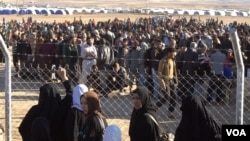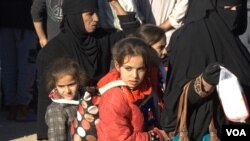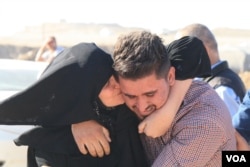They came to the camp packed in cars, buses and flatbed trucks, and even on tractors.
Some children waved their hands and made victory signs, while others looked terrified as the row of vehicles inched toward the dusty parking lots. Families then joined the long lines of people waiting to register their names with aid organizations, and be assigned a tent at the Khazir camp in Kurdish Iraq.
"We've been waiting to get out for two years," said one mother of four. "Our village was freed three days ago, but IS is sending mortars from Mosul."
On the outskirts of Mosul, the Iraqi army advanced toward the city center, operating in Iraq's second-largest city for the first time in more than two years. As the army pushed forward, the region's latest humanitarian crisis began in earnest.
"They are fleeing terrible situations," said Rizgar Barzani, who manages the camps for the Barzani Charity Foundation. "When they get here, they feel better since they know they are safe."
Safe, he said, but the oncoming winter in the camp may be harrowing without more resources. The International Organization for Migration reported Thursday that nearly 22,000 people have fled their homes since the operation to re-take Mosul began more than two weeks ago. A million are expected.
In Photos: Khazir Camp Kurdistan, Northern Iraq
Joyous reunions
Near one of the camp gates, as the masses of vehicles — many waving white flags — pulled in, one mother, Fazila, found her son, who had stayed behind in Mosul when much of the family fled more than two years ago.
Fazila's husband was sick when they escaped, and her son stayed behind to care for his father, who died two months ago.
For at least 20 minutes she wept for joy and held her son, kissing his cheeks and the cheeks of nearby soldiers and reporters. Along the corridor of vehicles and by gates and fences, other families reunited.
"I cannot believe I am finally seeing my son," Fazila wept, before fainting from the strain. Her son splashed water on her face, shouting "Mom, mom," until she woke up. Soldiers and aid workers hustled her into a car to drive her to her assigned tent about 200 meters away.
"I finally left home," he said. "When I saw my family here, I ran to them."
Harrowing tales
Inside the camp, hundreds of families who had arrived in the past few days set up laundry cords and collected blankets and lights from aid workers.
Anwar Salam, a former taxi driver, arrived late Wednesday with his son, also Anwar. His wife and other five children stayed behind, judging flight to be more dangerous than hiding. The younger Anwar, however, had a sharp item embedded in his leg when mortar fire hit the village Wednesday. He needed to go to the hospital.
"The past two years were the hardest of our lives," Salam said, describing beheadings and whippings, and more than two years without a job. The latest horror, he said, was in a nearby village, Waadi Hajjar.
"Loser Islamic State" is a rough translation of graffiti found in Waadi Hajjar, he said. About 500 young men were then rounded up by IS militants, according to Salam.
"No one knows what happened to the young men," he said.
Around the corner, 27-year-old Ahmed wore an IS-style beard and carried a scissor. "I want to shave," he said. "But this is all I could find."
A former Iraqi police officer, Ahmed spent most of the past two and half years in his home, hiding in a meter-deep pit when IS soldiers came to the door. Among his friends were police officers who were beheaded or hanged, with some bodies left dangling from bridges.
"When they arrested someone," he said, describing some of the horror, "they would tie their hands behind their backs and give weapons and money to 16- or 17-year-old boys to kill them."







